- Home
- Janice Kay Johnson
First Comes Baby Page 2
First Comes Baby Read online
Page 2
Was she scared about the procedure? Laurel did hate annual exams, but she liked the woman doctor she saw at the Women’s Health Clinic. She trusted her to be gentle and as unobtrusive as possible. While it was happening, veiled from the doctor by the white sheet, she would close her eyes and think, A baby. Soon, soon, I’ll feel movement inside, and my belly will swell and you’ll hear my voice. She wasn’t afraid.
But she was, of something. She just didn’t know what.
If she stayed very still, the wave would slowly ebb away, leaving her sitting on the bus, her stop still to come, her seatmate unaware of the terror that had swept over her. She would sag the slightest bit in relief, perhaps lean her head against the thick glass of the window, the cool smooth surface more comforting than a hug.
Soon, soon. Then I won’t be afraid.
She hated being afraid, feeling vulnerable, and refused to surrender to these panic attacks in any way.
Her period came on time, to the day when she’d expected it. Her last in a year or more, she hoped. She intended to breast-feed, and she knew that often delayed the resumption of menstruation, sometimes for six months or more after delivery.
Of course, she might not get pregnant the first month. There were no guarantees. She wouldn’t get discouraged. She could afford the additional procedures.
But she wasn’t sure she could bear the panic attacks, day after day, for another month. Or one after that.
They didn’t come when she was home alone, thank goodness. She didn’t like it when the wind scratched the branches of the maple against her bedroom window at night, or when the house settled and creaked. When she heard a cough outside, late, or the clatter of a garbage can as if someone had brushed it. She was a woman who lived alone in a city that was safer than many, but still a city, so of course she had those anxieties. The important part was, they no longer paralyzed her.
It was the idea of getting pregnant that did. Something about her plan wasn’t quite right. Maybe it was only the unconventional way, the impersonality. Not how a young woman dreamed of conceiving her first child.
Once it was done, Laurel was convinced, she’d be okay.
Just today, she’d talked to Matt. She hadn’t seen him or Sheila in the two weeks since she’d had dinner at their house and asked them for the ultimate favor. But she called legal aid, where Matt still worked and said, “Just wanted to say hi.”
“Hey.” He sounded distracted. “Got a doozy today. Landlord from hell. Mildewed, sagging ceiling collapsed and badly hurt a toddler. A few rats fell with the ceiling. Sounds Third World, doesn’t it?”
“At the very least. Will the child be okay?”
“Doctor thinks so. But I’m going to nail the landlord’s hide to the wall.”
“You go get ’em.” Laurel felt a momentary pang for the days when she’d imagined that someday she, too, would be a crusading attorney.
“We still on?”
There was something in his voice. Lack of enthusiasm? Hope that they weren’t still on? Or was her paranoia reading shades of gray into a casual question?
“Yep. Two more weeks.”
She heard a muffled voice.
“Listen. Got to go. We’ll talk again?”
“Next week,” Laurel promised.
Disquiet made her chest feel hollow. Had she ruined a friendship she valued by asking this of Matt? Or would everything be fine, once it was done?
She turned back to her computer and made herself concentrate on the will she was writing. She worked as a paralegal for a firm of attorneys, but most often with Malcolm Hern, whose scrawled notes about the clients’ wishes she peered at frequently.
Nonetheless, she was relieved when five o’clock came and she could shut down her computer, don her raincoat, grab her purse and join the other flunkies leaving. This was one of the few times a day she was glad not to have her law degree. If she was working here as an attorney, there’d be no five o’clock departures for her. Nope, she’d be putting in sixty- or seventy-hour workweeks. She couldn’t be a single parent.
The elevator moved slowly, even after it was full, stopping at nearly every floor between the thirty-fifth, where her firm was located, and the ground floor. She hated being pressed against strangers this way, and always chose a corner if she could get into one. Even so, the man behind her had nearly full-body contact with her and his breath stirred the hair at her nape. Her relief when the light flashed on L and the elevator dinged and the doors slid open was profound. Still, she had to wait for others to exit ahead of her, had to suffer more jostling.
Laurel joined the exodus into the marble lobby, heading for the rotating glass doors. She hadn’t gone more than a few steps when a man fell into step with her.
“Can I offer the lady a ride home?”
“Caleb!” she exclaimed in delight. “You’re back in town.”
He wrapped a long arm around her shoulders and gave her a squeeze even as they kept walking. “Yep. Good trip. How are you?”
Oh, planning to get myself impregnated two weeks from tomorrow. Having daily panic attacks.
“I’m good. Can I offer you dinner?”
“I was planning to take you out.”
“I have beef stroganoff simmering in my Crock-Pot as we speak.”
“Deal.”
His smile was as amazing as ever although the effect was somewhat different now that he was a man rather than a boy. Most of his travels took him to Central and South America, which meant he was perpetually tanned, paler laugh lines fanning out from his blue, blue eyes. But the dimple still deepened in one cheek whenever he offered his beguiling, lopsided grin.
Caleb wore his hair longer than did most of the attorneys and businessmen in the lobby, not ponytail length, just a little shaggy, the curls making it constantly disheveled. He’d filled out a little in the years since college, but was still lean, and at a couple of inches over six feet he towered over her five foot four or so. Laurel was always aware of women’s heads turning when she was with him, not just because he was handsome, although he was. He had that indefinable quality that in an actor or public speaker would be labeled charisma. He exuded some kind of life force, perhaps a belief in himself that drew the stares.
And she was in trouble, she realized suddenly. Was she going to try to get through the evening without telling him what she was up to?
If she kept silent, he’d be hurt later, and for good reason. They’d always told each other everything important.
Everything but what she’d thought and felt when she’d been brutally raped during her first and only year of law school. That single subject was taboo. Only in her rape support group could she talk about that day, because every woman there understood in a way no man ever would.
Okay, this she’d tell him. She didn’t like explaining herself, hated the idea of having to tell him to butt out, it was none of his business. But secrecy would bother him more, she knew it would.
Typical Caleb, he’d found a parking spot on the street not half a block from the Drohman Tower where she worked. Nobody found street parking at this time of day downtown.
Nobody but Caleb, charmed as always.
“How was your trip?” she asked, once he’d pulled out into traffic.
“Really good. Haiti is always depressing. The poverty.” He shook his head. “But I’m excited about the cooperative we’ve got going there. Not just drum art, although the artisans in the group are making some wall sculptures that are different from the more common ones. But we’ve added a guy who makes the most extraordinary stone sculptures. Wait’ll you see them.”
In college, Caleb had been determined to work for a humanitarian organization like Save the Children. But during his time in Ecuador with the Peace Corps, he’d had what he’d described as a revelation. Outside aid wasn’t the key, self-sufficiency was. Every country in Latin and South America had unique, beautiful crafts that would bring high prices from Americans if they were made accessible to them. Instead of just buying
from artists, he helped organize cooperatives, often village- and even region-wide with profit sharing. Some were comprised only of women, many of whom had lost their husbands to war.
Caleb had started with a tiny store on University Avenue in Seattle, expanding it within a year and adding a second two years later in Portland. Now he had another in upscale Bellevue and a fourth in Tacoma, with a fifth planned for San Francisco. He also put out a catalog and sold through a Web site. He made a good living but passed on profits to the artisans in the cooperatives on a scale that stunned Haitians and Guatemalans who were accustomed to getting pennies for work that sold for a hundred dollars in the United States.
Caleb loved what he did and what he’d accomplished. Every time she saw him, Laurel felt an ache of regret and disappointment in herself. Her dreams had been as vivid as his, and now where was she? Working a nine-to-five job, getting through each day as well as she could.
Choosing to become a mother was the first decision she’d made in a long time that looked ahead, that said, I have hope. Maybe, just maybe, Caleb would be glad for her.
Traffic on I-5 was stop-and-go. Laurel could have gotten home nearly as fast on the bus that ambled down Eastlake and through the University District. But she didn’t care if the traffic ever opened up. It was wonderful just to be sitting next to Caleb, hearing him talk about the wretchedness he’d seen side by side with the need to create something beautiful. He spoke with admiration of the warmth of community he saw down there and felt Americans had lost, but he also told her about glorious Caribbean beaches littered with bits of Styrofoam and hypodermic needles, about the children and the politics and the disease. He was passionate, angry, awed—and still able to believe he could make a difference.
A few times she’d imagined traveling with him, seeing with her own eyes everything he described. Once he’d tentatively suggested she join him on a trip to Honduras and Guatemala. He’d talked about monkeys leaping through branches above crumbling Mayan ruins, patient women weaving all day long to provide for their families, sunshine and darting fish in coral reefs.
But by then, all Laurel had to buttress herself from the world was her routine. The safety of eating the same cereal every morning, sitting in the same chair at the table, catching the bus at the same time, knowing the faces of the other riders at her stop. She hadn’t been able to imagine herself catching a plane, going to a foreign country where she didn’t speak the language, taking a boat upriver to places without cars or telephones, to a place where her own life didn’t make sense. So she’d made an excuse. He’d looked at her for a grave moment with eyes that saw more than she wanted them to and he hadn’t asked again.
Laurel lived in a neighborhood off Lake City Way in north Seattle that had been built in the thirties and forties. The houses were modest but charming, wood-framed, owned mainly by young families. Hers was the anomaly, a homely 1950s addition with a flat roof, a one-car garage made of cinder blocks and a chain-link fence. She’d been lucky to be able to afford it with her father’s help. So far, her budget hadn’t allowed anything that could be called remodeling, but the chain-link fence was disappearing beneath the honeysuckle and climbing roses and clematis she’d planted along it, and she’d painted the formerly street-sign-yellow garage a more unobtrusive coffee-brown. Trellises and more climbers were masking its ugly facade.
Inside, she’d torn up the shag carpets to expose oak floors that needed refinishing but were still beautiful; however, she was living with 1950s-era plywood and veneer kitchen and bathroom cabinets, aluminum-frame windows that dripped and a shower so tiny and dark it gave her claustrophobia.
Caleb parked on the street and commented on the shoots coming up in her garden.
“I planted a bunch of bulbs last fall. Mostly hyacinths and daffodils.”
“Did I tell you that you inspired me?” he said, as she unlocked the door. “I planted a couple hundred tulips in October. With my luck, the moles have eaten them, but I tried.”
She laughed, not showing her astonishment at his choice of words. She had inspired him?
Comfortable in her house, he found the corkscrew in a drawer and opened a bottle of wine while she changed into jeans, a sweater and slip-on shoes, then put on water to boil for noodles.
“So,” Caleb said, “enough about me. Tell me about your life.”
He always put it that way, as if she had a life.
Today, Laurel thought with a tinge of defiance, she’d prove that she did.
“I’ve decided to have a baby.”
He swore, and she saw that he’d poured wine on the counter. He grabbed the sponge, mopped up, then handed her a glass.
“You didn’t just tell me you’re pregnant.”
“No, I told you I’m going to get pregnant.”
His eyes narrowed. “Just like that.”
“It happens really quickly,” she assured him.
“And usually requires a woman and a man.”
“You know I can’t… I don’t want…”
What she could have sworn was anger faded from his face. “I know. So you’re—what?—planning to find a donor?”
“I already have.” She busied herself dumping noodles into the now-boiling water. “You know Matt Baker? My friend from legal aid?”
Caleb’s tone was careful, controlled. “Isn’t he married?”
“Yes, that’s the beauty of it. I already spend a lot of time at their house. They have great kids. I’m Madison’s godmother. So it’ll give my child a sort of extended family.” Beginning to cut up broccoli, she hurried on. “I thought of going the anonymous-donor route, but that made me nervous. It’s like, every guy who donates is a future Nobel Prize winner. Brilliant, of course, handsome, athletic, a Ph.D. candidate in something or other. I mean, what are the odds? Some of them have to be ordinary. Or worse than ordinary. Schmucks. I wanted my baby’s father to be somebody…” Somebody, in another life, I might have loved.
Standing there in the kitchen, the knife poised above a clump of broccoli, she thought, But Matt isn’t.
Well, she did love him, of course. But not…not that way. He wasn’t anybody who ever would have attracted her, not even before. Was that the problem?
Caleb muttered a word she couldn’t quite catch. “I didn’t know you were thinking about anything like this.”
“It’s been just the past few months.”
“Why Matt?”
It was the last thing she’d expected him to ask.
“Well,” she faltered, “he’s a friend. And smart. He’s nice. Healthy. His grandmother lived into her nineties.”
“What does Sheila feel about this, Laurel?”
“She agreed…”
“That isn’t what I asked.”
Her breath caught; she had to face him. His eyes were steady. A couple of creases between his brows had deepened.
“I don’t really know,” she admitted. “She seemed okay…” She couldn’t finish the lie. Sheila had agreed, but she hadn’t seemed comfortable with the idea. She’d said yes with reluctance, Laurel guessed, perhaps in part out of pity.
Laurel hated knowing that.
Her cheeks heated and she looked away from Caleb, not wanting to see pity in his eyes, too.
There was a long silence. Neither of them moved. The water boiled beside her, and she stood there with the knife in her hand.
“Did you consider asking other friends?” Caleb’s voice was deep, quiet.
“I had a list…”
“Was I on it?”
The air had been sucked from the room. She couldn’t answer.
“Did you consider asking me, Laurel?” he persisted.
From somewhere, she found the courage to whisper, “What would you have said if I had asked?”
“I would have said yes.” He paused. “I’d like to have a baby with you, Laurel.”
CHAPTER TWO
“DO YOU MEAN THAT?” Laurel’s question came out, a mere thread of sound.
“I mean
it.” He nodded at the glass. “Have a drink of wine.”
She gulped, grateful for the warmth that flowed to her stomach. Her emotions were in such turmoil she had no idea how she felt about his offer.
Caleb wasn’t on her list. The only guy she’d put on it who wasn’t married was George, who was gay and therefore safe.
Caleb wasn’t safe. She knew that much, from the panic and exhilaration and excitement ricocheting through her.
“Hey,” he said, voice gentle. “We’d better finish dinner.”
“Dinner?” She turned her head and stared blankly at the water boiling over on the stove and sizzling on the burner. “Oh. Yeah.” But she didn’t move.
“Broccoli,” he suggested, and squeezed by her in the narrow galley kitchen to take the lid off the noodles and turn the burner off. “Colander?”
“Um…bottom cupboard.” She pointed.
He drained while she hurriedly chopped and put the broccoli on to cook.
Caleb got plates out and said, “We don’t have to be fancy. Let’s just dish up here. We can come back for the broccoli.”
“Oh. Okay.”
She got out silverware while he dished up, and then followed him to the table.
There she studied him as if for the first time, seeing again the changes maturity had brought to his face. He’d become the man he had hoped to be, something not many people could say. His eyes were more serious, sometimes wary; his smiles still lit up a room, but came more rarely. He thought about what he did and said now, and what had once been idealism had now become acknowledgment of the responsibility he had taken on for so many other people. Once, when she’d looked at him like this, Laurel would have been able to read everything he felt on his face. Sometime in the past ten years, he had learned to shield his emotions. She hadn’t noticed that until now.
He watched her, his expression merely rueful.
“I wasn’t on your list, was I? You wouldn’t be so stunned if you’d ever thought about asking me.”

 Home Deadly Home
Home Deadly Home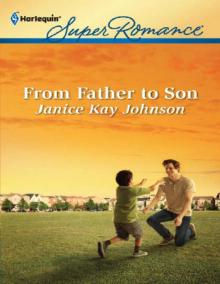 From Father to Son
From Father to Son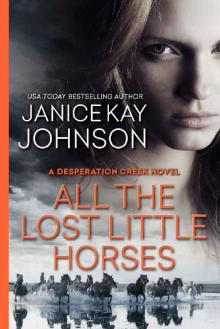 All the Lost Little Horses (A Desperation Creek Novel Book 2)
All the Lost Little Horses (A Desperation Creek Novel Book 2) Hide the Child
Hide the Child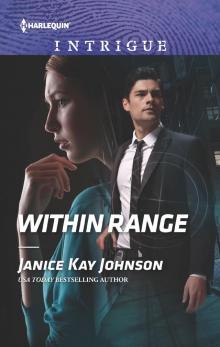 Within Range
Within Range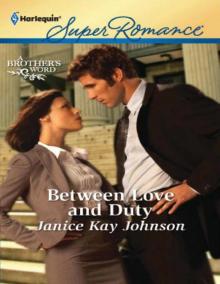 Between Love and Duty
Between Love and Duty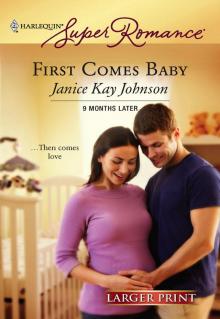 First Comes Baby
First Comes Baby Charlotte's Homecoming
Charlotte's Homecoming In A Heartbeat (HQR Superromance)
In A Heartbeat (HQR Superromance)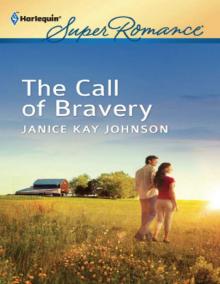 The Call of Bravery
The Call of Bravery In Hope's Shadow
In Hope's Shadow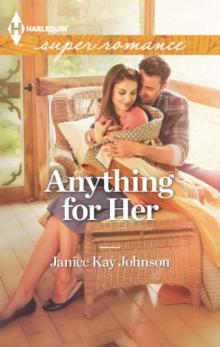 Anything for Her
Anything for Her Harlequin Superromance September 2014 - Bundle 1 of 2: This Good ManPromises Under the Peach TreeHusband by Choice
Harlequin Superromance September 2014 - Bundle 1 of 2: This Good ManPromises Under the Peach TreeHusband by Choice The Baby Agenda
The Baby Agenda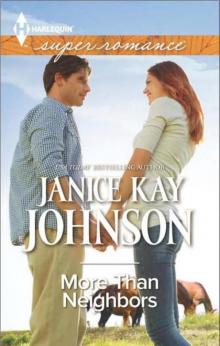 More Than Neighbors
More Than Neighbors Her Amish Protectors
Her Amish Protectors All That Remains
All That Remains Whisper of Revenge (A Cape Trouble Novel Book 4)
Whisper of Revenge (A Cape Trouble Novel Book 4)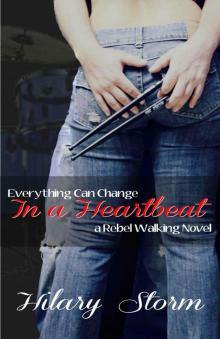 In a Heartbeat
In a Heartbeat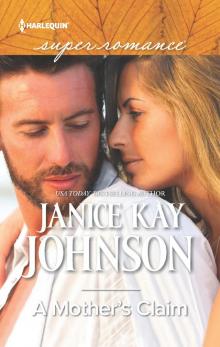 A Mother's Claim
A Mother's Claim Because of a Girl
Because of a Girl Back Against the Wall
Back Against the Wall Dangerous Waters
Dangerous Waters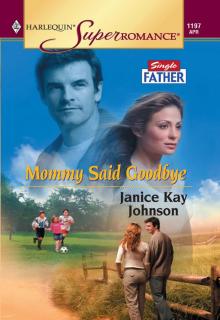 Mommy Said Goodbye
Mommy Said Goodbye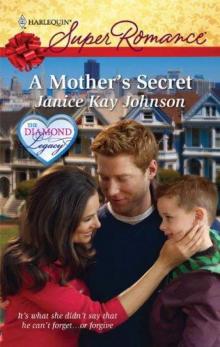 A Mother's Secret
A Mother's Secret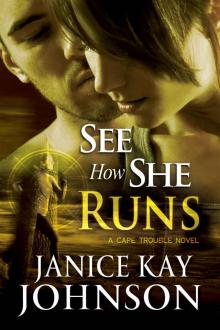 See How She Runs (A Cape Trouble Novel Book 2)
See How She Runs (A Cape Trouble Novel Book 2) Plain Refuge
Plain Refuge Bringing Maddie Home
Bringing Maddie Home For the Girls' Sake
For the Girls' Sake Through the Sheriff's Eyes
Through the Sheriff's Eyes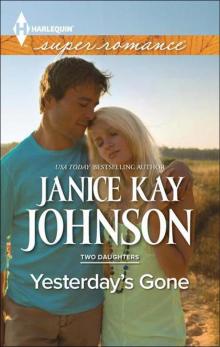 Yesterday's Gone (Two Daughters Book 1)
Yesterday's Gone (Two Daughters Book 1) All a Man Is
All a Man Is Harlequin Superromance January 2014 - Bundle 1 of 2: Everywhere She GoesA Promise for the BabyThat Summer at the Shore
Harlequin Superromance January 2014 - Bundle 1 of 2: Everywhere She GoesA Promise for the BabyThat Summer at the Shore No Matter What
No Matter What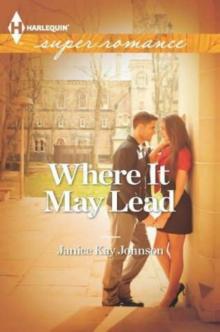 Wakefield College 01 - Where It May Lead
Wakefield College 01 - Where It May Lead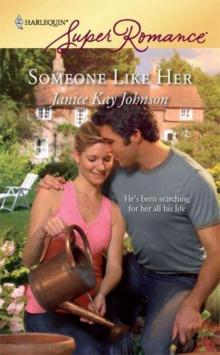 Someone Like Her
Someone Like Her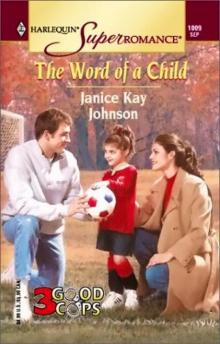 THE WORD OF A CHILD
THE WORD OF A CHILD Harlequin Superromance May 2016 Box Set
Harlequin Superromance May 2016 Box Set Open Secret
Open Secret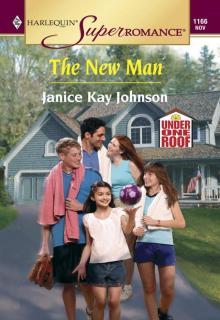 The New Man
The New Man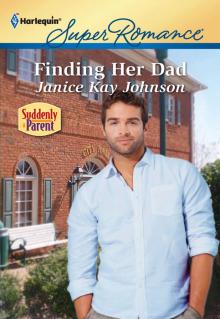 Finding Her Dad
Finding Her Dad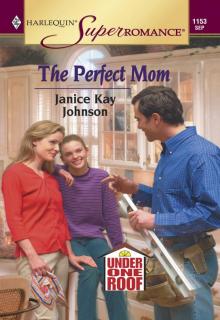 The Perfect Mom
The Perfect Mom All Through The House
All Through The House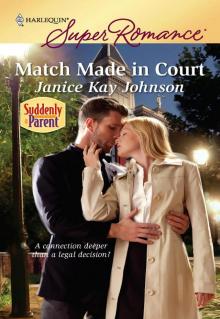 Match Made in Court
Match Made in Court Making Her Way Home
Making Her Way Home From This Day On
From This Day On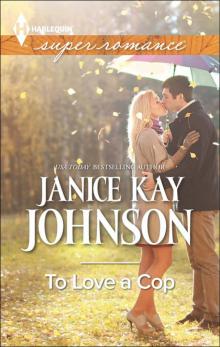 To Love a Cop
To Love a Cop The Hero's Redemption
The Hero's Redemption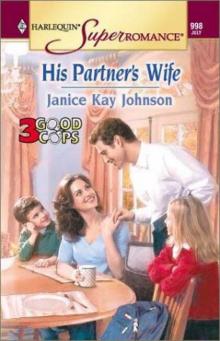 HIS PARTNER'S WIFE
HIS PARTNER'S WIFE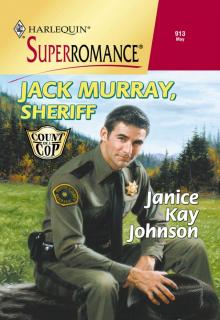 Jack Murray, Sheriff
Jack Murray, Sheriff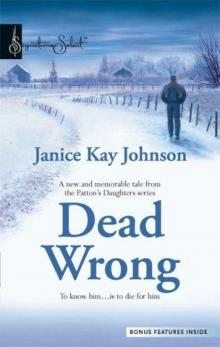 Dead Wrong
Dead Wrong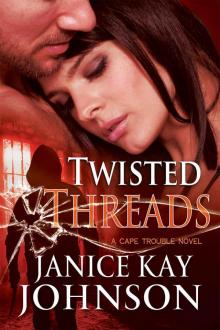 Twisted Threads (A Cape Trouble Novel Book 3)
Twisted Threads (A Cape Trouble Novel Book 3)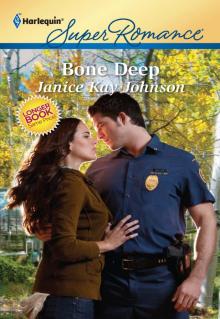 Bone Deep
Bone Deep The Closer He Gets
The Closer He Gets With Child
With Child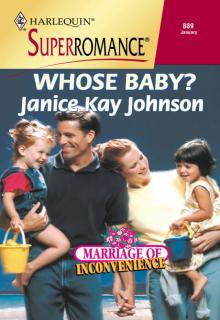 Whose Baby?
Whose Baby? Kids by Christmas
Kids by Christmas